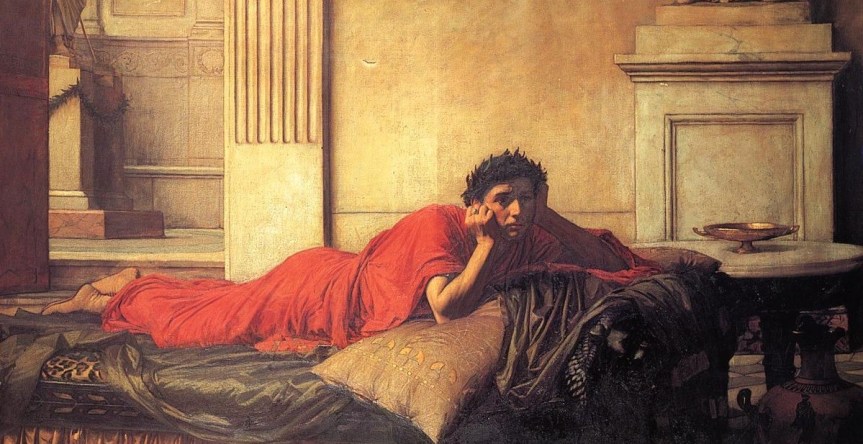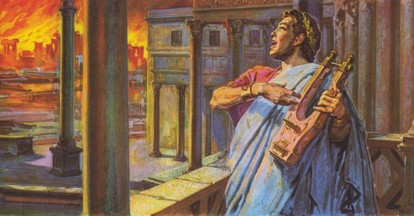Just two years after taking over the empire, Nero, especially under the influience of Stoic philosopher Seneca, is detached from the influience of that time and suspends the secret tribunals that terrorized the Roman elites in particular during the reign of Claudius. The new emperor is generous, benevolent, forbids bloody shows in circusses, suspends the death penalty, and greatly improves the legal condition of slaves. Economically, Nero cuts taxes and gives money to the calamity or disadvantaged areas of the empire. He also decides to organize cultural, sporting events and competitions for intellectuals and artists, as well as numerous athletic competitions.
Under Claudius, the Jewish population had been expelled from Rome. Nero eliminates discrimination of Jews and supports their comunities. In most respects, in the emperor’s works, Seneca’s influience can be noticed. However, it’s remarkable that even people who participated in conspiracy against him were sometimes, not in all cases, absolved of punishment under Nero’s order. But the happy period of Nero-led empire does not last long…
*
Large human comunities do not bear, above all, madness and extravagances; anyway, not the ones that come up with incomprehesible exaggerations. Nero kills his mother, a monstruous woman, yet his mother, and this deed is done by the gentle Nero in year 59. Once the phenomen of ferocity has begun, the emperor goes in the direction dictated by this: in 62 Nero kills his wife, Octavia, because he was in love with Popeea Sabina with whom he will marry, but she will soon die. Follows a third marriage.
In the ambience of the exceptional and elevated Roman and Greek culture, the Emperor believed he was a great, brilliant poet, a harp singer actor, but also a combat carriage driver in the hippodrome. Exorbitant parties and orgies start since 56; killings begin in 59; eccentric behavior occurs soon after taking over the empire, but it is constantly on the rise.
A fact is still required: the appetit for addresing the patological and spicy aspects of the Nero’s life and all the other criminal kings, this being done by both historians of ancient and modern age, as well as those who popularize history, which is due to commercial reasons.
The deeds of the second period of Nero’s reign, that of abuses, are unacceptable, but what caused such an evolution, not in the life of this emperor, but also of other personalities, was to institue the assasination in principle of the succesion.

The death of pretorian prefect, Burrus, in 62, also cancel Seneca’s political influience. Until this event the empire had been a true military-philosophical dictatorship, but from now on it became an exclusively military dictatorship. Under Nero, the empire gains some succes in foreign policy, more specifically in conquest policy, but it does not compensate the lack of respect for the emperor’s autorithy within the state.
In 64, when a fire distroys much of Rome, most people think they recognise the guilty peroson in the Emperor. Nero, who at the outbreak of the fire was at Antium, accuses this deed of the Christian community. The persecutions are triggered, which in the future will represent the pattern of periodic behavior of the Roman emperors, even of an emperor like Marcus Aurelius, until the singning the Milan edict, in 313, by Constantin the Great. State terrosim is now manifsted in anti-Christian persecution, in its more characteristic form. It is even used to stir up the most sinister instincts of men by martyred Christians during the grandiose circus performance, offering the public a large number of prey animals destroying the convicts.
Relatively credible historical analyzes show that Nero would not have been the one who set fire to Rome, which other talked about, attribuiting to him the blame for the outbreak of the fire. They raise the hypothesis that there was a conspiracy to try to simultaneously compromise the imperial function and the Christian religion, and to create a long-lasting tension in the empire.
In 65 there is an unsuccessful attempt to replace Nero, with a blow to force, with Gaius Calpurnius Piso, a conspiracy involving first-rate personalities, including Seneca. The philosopher, like Petronius, will be forced to suicide.
The history of Nero’s reign is that of his paranoid delirium marked by infantile illusion of his own artistic genius, anti-Christian terror, unacceptable appearances as actor in roles of slaves or pregnant women.
The legions revolt in Gaul and in the Orient. Galba is declared the emperor, and the Senate condemns Nero to be executed according to the method applied to the slaves. The Pretorian Guard abandons Nero and the dictator of only 31 years old is forced to commit suicide.
*
From such psychology as Nero’s, how can we understad it, what psyhological conclusions can we draw ?
It has been said that any power corrupts, and absolute power corrupts absolutely. There is a great error: power does not corrupt, as it only exists as appearance by limiting to a specific concrete. Absolute power is, as a consequience, all the more a nonsense. It turns out to be a simple trivial tool of intimidation, as is the case with the normal human world.

In the long evolution of humanity, nine out of ten dictators who have explicitly used what they belived to be their power have died for this very reason, assassinated, convicted and executed. The great rulers knew how to dispose of absolute power without trying to exercise it effectively. Augustus communicates openly with all the citizens of Rome. Alexander the Great does not accept receiving water in the desert unless the same quantity is distributed to soldiers. Power still exists, at least temporarily, but only if it is not assumed esclusively in selfish, capricious, arrogant, defiant use. State terrorism has given ephemeral benefits to its practitioners. Being capricious, killing from the simple desire of blood, torturing at will are ways to make the simulation of madness a real political terror. But beware: this is followe by self-condemnation of the abuses of the soul. Once tried, as a simple gesture, alienation becomes even mental alienation.
*
Nero has gone through a paranoid progressive alienation with tipical megalomania, the delusion of grandeur becomes a way of justifying the excess of authority. The empire had become his possession because of the murders of his predecessors and his mother. Nero attempted to justify his right to supreme authority through his imaginative artistic qualities. The murder of his own mother was simbolically a separation from the detestable course of the history of Rome and his Iulio-Claudian dynasty that brought him to the throne on the path of crime. His deed is a missed one, as it is a false solution, consisting in an extra and horrible crime.
In psychiatry there is a theory of learning psychiatric illnes. The disease develops progressively, the subject learning to be crazy. It is obvious that in the Roman Empire the alienation, in such cases as Nero’s, was the way we could call it didactic. In an over-cultivated but polarized society, alienation goes through the pathogenic mechanism of learning.
How does it happend that some emperors managed to escape the enourmus danger of abuse of power, of psychiatric gravity ? On the one hand, obviously are the personal, genetic, cultural, environmental circumstances. But there is something else: history is psychologically an associationist phenomenon. After a succession of associations through similarity, follow the contrast associations.
Caius Traian Dragomir, Patologia dictatorului Nero

